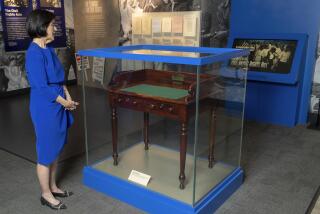Concerns mount over Bush library
- Share via
HOUSTON — More than a quarter of the faculty at Southern Methodist University on Thursday demanded a referendum on whether the Dallas campus should become the home of the George W. Bush Presidential Library, if that means accepting a conservative think tank as part of the deal.
The petition, which was signed by 170 faculty members -- including professors from all six SMU schools, several department chairs and past presidents of the faculty senate -- is the latest sign of rancor over the proposal to bring Bush’s papers and an institute touting his legacy to the university.
SMU is the alma mater of First Lady Laura Bush, who sits on the private school’s board of trustees. It was selected as the chief finalist for the library last month by a search committee of Bush loyalists that includes former White House Chief of Staff Andrew H. Card Jr. and former Commerce Secretary Donald L. Evans.
University President R. Gerald Turner is among a group of professors and school officials that strongly supports the library. These backers argue that it would yield invaluable insights for future scholars and bring prestige to SMU.
But for months, other professors and some Methodist ministers have been voicing concerns about whether the school should be affiliated with a president whose positions -- including the decision to invade Iraq -- do not, in their view, represent Methodist values. Some also worry that the school’s reputation for academic freedom would be compromised by having a partisan Bush Institute on campus.
The search committee has proposed that the institute be controlled by a private Bush foundation, which would appoint its fellows.
The debate took off in November, when the SMU Daily Campus printed an opinion piece titled “The George W. Bush Library: asset or albatross?” The authors -- William K. McElvaney, a professor emeritus, and associate professor Susanne Johnson, both of the Perkins School of Theology -- made clear where they stood.
“Do we want SMU to benefit financially from a legacy of massive violence, destruction, and death brought about by the Bush presidency in dismissal of broad international opinion?” the two wrote. “What moral justification supports SMU’s providing a haven for a legacy of environmental predation and denial of global warming, shameful exploitation of gay rights, and the most critical erosion of habeas corpus in memory?”
It was not opposition to Bush’s politics, however, but concerns over the relationship between the school and the Bush Institute that led to this week’s petition drive, one of its organizers said.
“I don’t want to see a Bush Institute that is at SMU, but not of SMU,” said David Freidel, an anthropology professor and former faculty senate president. “If we are going to embrace this partnership, we better know what we are getting into.
“The issue is being framed, incorrectly in my view, as a referendum on the president and his policies,” Freidel said. “I have no problem with a presidential library, and most people I know do not either. But the president’s search committee does conceive of this think tank as an autonomous group of fellows who would pursue the president’s policies, be they compassionate conservatism or the war on terror.”
It was not clear what would result from the petition, which sought a vote on whether the Bush Institute was supported by the school’s more than 600 faculty members.
The current faculty senate president, Rhonda Blair, said she planned to study whether a referendum was possible under university bylaws.
“This is really a reflection of SMU’s tradition of open dialogue on our campus,” said Brad Cheves, the school’s vice president for development and external affairs. “We fully support that. This process has been collegial and respectful.”
James F. Hollifield, the director of SMU’s Tower Center for Political Studies, said that although many professors claim their opposition to the library has nothing to do with their personal views on Bush, they are being insincere.
In a recent New York Times opinion piece, Hollifield recalled how his alma mater, Duke University, decided not to build a library and museum dedicated to Richard M. Nixon, a graduate of Duke’s law school, because of concerns that the school would be linked to one of the country’s most controversial presidents.
He believes that was a mistake -- and that if SMU passes on the Bush library, it too will look like an error in hindsight.
“I know it is hard to separate the man, and the politics of the moment, from the institution of the presidency, but we will be studying this institution long after President Bush is gone,” Hollifield said Thursday.
“This is a huge opportunity, not only for SMU, but for Dallas and all of Texas. All this angst is misplaced.”
More to Read
Sign up for Essential California
The most important California stories and recommendations in your inbox every morning.
You may occasionally receive promotional content from the Los Angeles Times.









